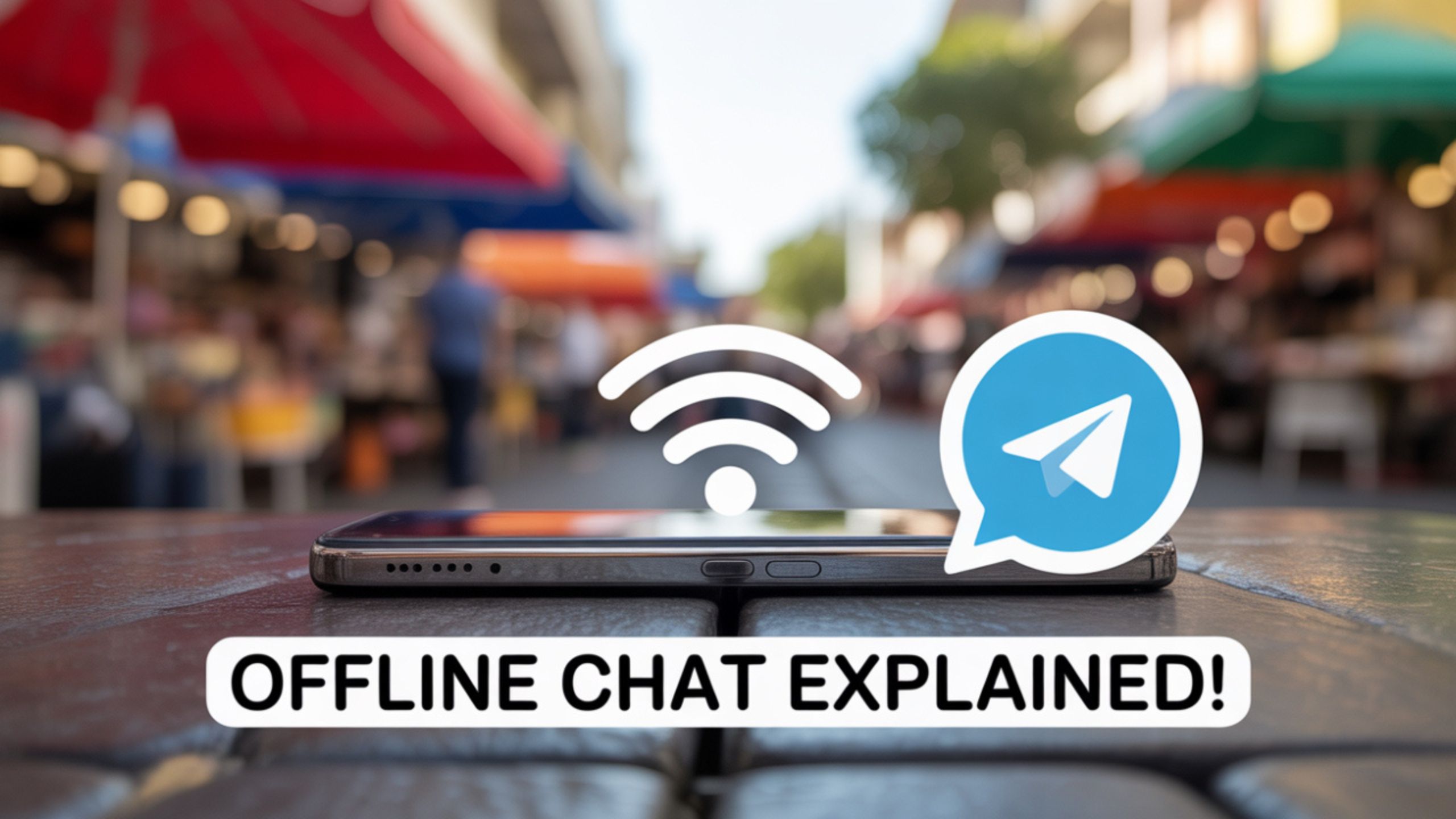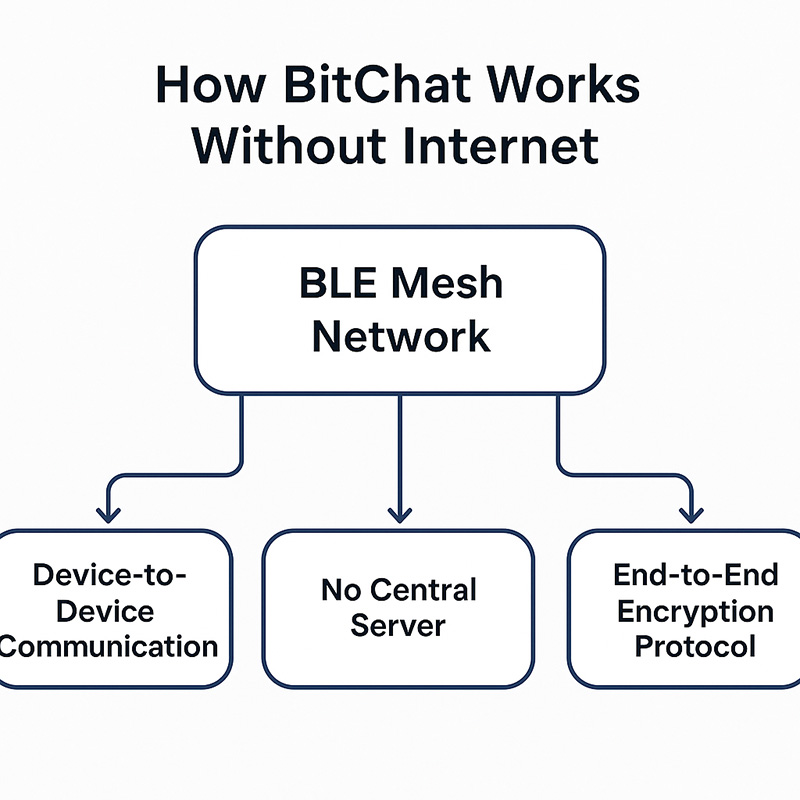A groundbreaking innovation has arrived in an age where privacy, decentralization, and independence from internet infrastructure are becoming essential to communication. Jack Dorsey, co-founder of Twitter and a prominent advocate for decentralized technologies, has unveiled Bitchat, a revolutionary peer-to-peer messaging app that redefines the fundamentals of communication. Unlike conventional messaging platforms that rely heavily on centralized servers, data harvesting, and internet connectivity, Bitchat introduces an offline-first, secure, and censorship-resistant messaging environment using Bluetooth Low Energy (BLE) mesh networks. Here’s a deep dive into everything you need to know about Bitchat — its technology, potential use cases, advantages, and limitations.

What is Bitchat? A New Paradigm in Messaging
Bitchat is a decentralized, open-source messaging application without internet, accounts, or phone numbers. Powered by Bluetooth Low Energy (BLE) mesh networking, the platform enables devices to connect directly with one another and pass messages through a peer-to-peer (P2P) mesh, creating a truly serverless communication system.
The app is developed as part of a public domain protocol initiative, aligning with the broader movement toward digital sovereignty, censorship resistance, and privacy protection. By removing traditional internet dependencies, Bitchat provides users with a method of communication that works in remote areas, crisis zones, or under oppressive regimes.
How Bitchat Works Without Internet Connectivity
Bitchat leverages Bluetooth Low Energy (BLE), a wireless personal area network technology for short-range communication with minimal energy consumption. Here’s how the system works:

- Device-to-Device Communication: Each device acts as a node in the mesh network. When a user sends a message, it travels from device to device through intermediate nodes until it reaches the recipient.
- Mesh Network Formation: As more devices join the network, the mesh becomes stronger and more expansive, improving message routing and reliability.
- No Central Servers: No centralized server controls the network or stores messages. This means no single point of failure, enhancing security and uptime.
- Store and Forward Protocol: Messages are temporarily cached on intermediary nodes if the destination is not in immediate range, and forwarded once it becomes reachable.
This mesh-based structure enables offline communication in areas with zero mobile signal, internet blackouts, or network censorship.
Core Features of Bitchat
1. No Internet Required
The defining feature of Bitchat is its ability to operate independently of the internet infrastructure. You can stay connected whether camping in a forest, attending a music festival, or stuck in a disaster-hit zone.
2. Account-Free Operation
Unlike WhatsApp, Telegram, or Signal, Bitchat doesn’t require:
- Sign-up
- Phone number
- Email address
Users can start messaging immediately after installing the app, preserving complete anonymity and user sovereignty.
3. End-to-End Encryption
Security is at the heart of Bitchat. All messages are end-to-end encrypted, ensuring only the sender and recipient can read the content. Even intermediary nodes in the mesh network cannot decrypt the data.
4. Open-Source and Public Domain
Bitchat’s codebase is fully open-source, allowing developers and privacy advocates to audit, modify, or fork the project. Its public domain status guarantees that no single entity holds proprietary control over the platform.
5. Bluetooth Mesh Networking
Using BLE mesh, Bitchat connects nearby devices up to 100 meters apart. The network scales dynamically in dense environments with multiple users, offering greater message reliability and throughput.
Real-World Use Cases of Bitchat
1. Natural Disasters and Emergency Communication
In the wake of earthquakes, hurricanes, or floods, internet services and cellular towers often collapse. Bitchat can become a lifeline, enabling emergency responders and civilians to exchange messages without infrastructure.
2. Activism Under Surveillance
In regions where authoritarian regimes monitor or block online platforms, activists can use Bitchat to organize securely and anonymously without tipping off the authorities.
3. Off-Grid Travel and Expeditions
Trekkers, campers, and backpackers often venture into locations without signal coverage. Bitchat provides a reliable communication channel among group members in such scenarios.
4. Schools and Universities
Institutions can implement Bitchat in classrooms, libraries, or campuses for low-energy, instant messaging without burdening Wi-Fi networks.
Limitations of Bitchat
While Bitchat introduces a powerful concept, it is not without constraints:
1. Limited Range
The app’s reliance on Bluetooth means each device can only directly communicate within a 100-meter radius. Wider communication depends on mesh density, which may be ineffective in sparsely populated areas.
2. Message Latency
In mesh networks, especially those with limited nodes or congested paths, messages may experience delays as they hop across devices.
3. No Media or File Sharing (Currently)
As of now, Bitchat supports only text-based communication. Media sharing, like images, videos, or documents, is not yet implemented.
4. Battery Consumption
Although BLE is optimized for low energy use, constant broadcasting and relaying of messages across devices could impact battery life over time.
5. Security Depends on Device Integrity
If a device participating in the mesh is compromised, it could track metadata (like message hops or signal strength), although message contents remain encrypted.
Jack Dorsey’s Decentralized Vision
Jack Dorsey’s backing of Bitchat aligns with his broader ambition to decentralize social media and online communication. Through initiatives like Bluesky and now Bitchat, Dorsey is advocating for an internet future that is open, user-controlled, and resilient against surveillance capitalism and authoritarian controls.
His involvement has lent credibility and attention to Bitchat, making it not just a tool but a philosophical shift in how we approach digital communication.
Future Roadmap and Development
While Bitchat is still in its early stages, future updates may include:
- Support for multimedia sharing
- Stronger routing algorithms for faster message delivery
- Compatibility with other mesh protocols like Wi-Fi Direct
- Cross-platform support, including iOS and desktop
Community involvement is encouraged, and developers worldwide are invited to contribute to the codebase, report issues, and build extensions.
Wrap Up: Bitchat as a Beacon for Decentralized Communication
Bitchat is more than just a messaging app — it is a statement of independence, a tool for freedom of expression, and a practical solution in scenarios where traditional networks fail. With no need for accounts, internet, or infrastructure, Bitchat puts power back in the hands of users.
As Jack Dorsey champions the evolution of digital communication, Bitchat stands at the forefront of a decentralized future, promising privacy, resilience, and accessibility for all.

Selva Ganesh is a Computer Science Engineer, Android Developer, and Tech Enthusiast. As the Chief Editor of this blog, he brings over 10 years of experience in Android development and professional blogging. He has completed multiple courses under the Google News Initiative, enhancing his expertise in digital journalism and content accuracy. Selva also manages Android Infotech, a globally recognized platform known for its practical, solution-focused articles that help users resolve Android-related issues.




Downloaded the app. Can’t wait to test it.
Appreciate the honesty in covering its limits.
Why isn’t this being talked about more?
I wonder how it compares with FireChat.
Solid overview. Learned something new today.
Would love a demo video too.
Is this open-source or proprietary?
Kudos to the dev team behind Bitchat.
Offline communication is underrated. This proves it.
Every day, new innovations! Thanks for sharing.
Great to see tech being made for the disconnected.
More people need to know about this tech.
I like how the article breaks down each feature.
Impressive and well written as always.
Looking forward to updates and improvements.
Can it handle large groups or just one-on-one?
Wish more apps focused on privacy like this.
Very different from traditional messaging. Good innovation.
This could help in areas with censorship.
Clear explanation. Loved the format too.
Bookmarking this. Will recommend to others.
Fascinating stuff. Hope it scales well.
I can see this helping in disaster zones.
Just tested the app. Works like a charm.
Thanks for the write-up. Needed this info.
One of the best overviews I’ve read. Appreciate it!
Cool! Does it use Bluetooth or Wi-Fi Direct?
Was skeptical at first but this post changed my mind.
Impressed by Dorsey’s vision. He’s always ahead.
A very timely post. Offline tools are in demand.
Limitation part was well covered. Good job.
These features are unique. Great review!
Not sure how practical it is now, but promising.
I shared this with my tech group. They loved it.
Offline-first tech should be the new normal.
I’m excited to see where this leads in the next few years.
This article explains things in a really simple way.
Mesh-based communication could be the future.
Thanks for keeping us updated with new apps like these.
Nice read. The tech world is evolving so fast.
Will it work on all devices or only specific platforms?
The idea of decentralization without the net is powerful.
Interesting concept. I wonder how secure it is though.
Perfect for travelers or people in remote locations. Thanks for this!
Offline messaging needs more attention. Glad someone is covering it.
Great breakdown of limitations too. Not many blogs do that.
This tech reminds me of early mesh networks. Super cool.
Very informative article. I had no idea such apps existed.
Jack Dorsey’s vision is truly forward-thinking. This could empower so many.
No internet required? That’s a game changer for emergencies.
Bitchat sounds revolutionary. Can’t wait to try it out in rural areas.